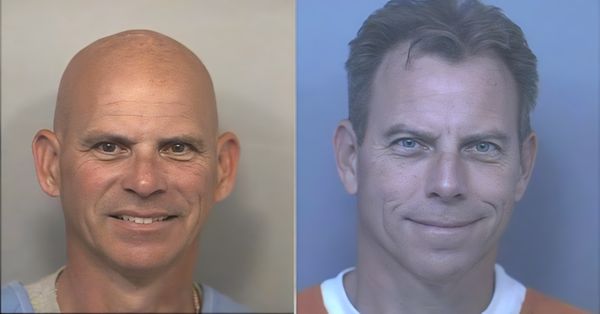MANILA, Philippines – The plebiscite on the Bangsamoro Organic Law on Monday, January 21, is a step closer to the finish line of decades' long struggle for peace in Mindanao.
It is also a culmination of efforts by both government and Moro Islamic Liberation Front (MILF) negotiators to strike a peace deal. (READ: After Bangsamoro law, a bright yet bumpy path to peace)
What happened in the two decades since the first exploratory talks began?
Click below to see the developments per year
1996 | 2000 | 2008 | 2010 | 2011 | 2012 | 2013 | 2014 | 2015 | 2016 | 2017 | 2018
1996
The government of then-president Fidel Ramos holds the first exploratory talks with the Moro Islamic Liberation Front. The talks culminate with the signing of a "general cessation of hostilities" between the two parties in July 1997.
2000
Then-president Joseph Estrada declares an "all-out war" against the MILF after a series of terrorist attacks in Mindanao.
2008
The government of then-president Gloria Macapagal Arroyo and the MILF sign the Memorandum of Agreement-Ancestral Domain (MOA-AD) which creates the so-called Bangsamoro Judicial Entity. It is met with widespread opposition, ending with the Supreme Court declaring the agreement unconstitutional.
2010
Then-president Benigno Aquino III forms an advisory council to assist the government in the peace talks.
2011
AUGUST 5
MILF chair Murad "Al Haj" Ebrahim and Aquino meet for the first time in Tokyo, Japan. The meeting ends with both agreeing to push on with the peace process.
2012
OCTOBER 7
The Philippine government and the MILF conclude the 32nd round of talks resulting in a framework agreement that seeks to create a Bangsamoro region.
OCTOBER 15
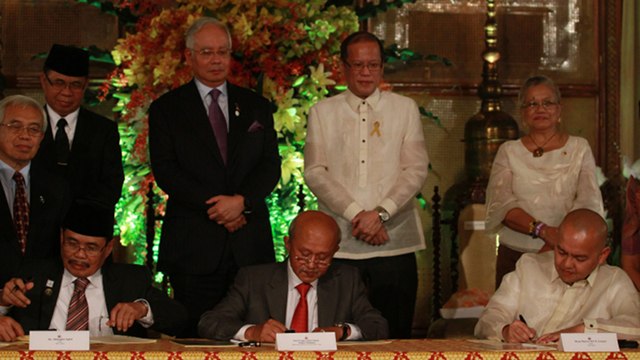
The two parties sign the historical framework agreement in Malacañang.
NOVEMBER 17
The 33rd round of peace talks – which focuses on power-sharing, wealth-sharing, and normalization in the Bangsamoro region – ends without any agreement signed between the two parties.
DECEMBER 16
The 34th round peace talks on December 16 concludes with a “technical impasse” over whether or not the MILF will lead the Bangsamoro Transition Authority.
DECEMBER 17
Aquino signs Executive Order 120 that creates the 15-member Transition Commission that will craft the Bangsamoro Basic Law.
2013
JANUARY 21
The 35th round of peace talks begins to settle the remaining unresolved issue in the transitional arrangements: who will lead the Bangsamoro Transition Authority?
FEBRUARY 27
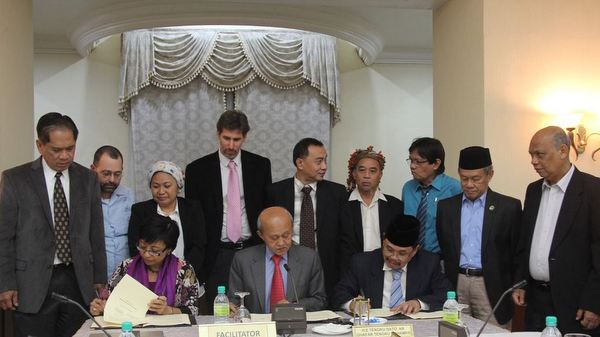
The two parties sign the Annex on Transitional Arrangements and Modalities.
APRIL 11
The 37th round of peace talks – which was postponed – ends without any agreement being signed.
JULY 8
The 38th round of peace talks begins – two days after the Bangsamoro Islamic Freedom Fighters (BIFF) ambushes an army truck and attacks an army camp.
JULY 11
The parties leave the negotiating table with no signed agreement, with MILF peace panel chairperson Mohagher Iqbal describing the talks as "too rigid" and "fruitless."
JULY 12
The MILF agrees to return to the negotiations. After a hiccup that involves the two parties agreeing to extend, the annex on wealth sharing – which gives automatic appropriations to the Bangsamoro, among others – is eventually signed a day after on July 13.
AUGUST 25
The 39th round of peace talks ends without a signed agreement.
SEPTEMBER 10
The 40th round of peace talks opens a day after suspected members of the Moro National Liberation Front (MNLF) take over 4 barangays in Zamboanga City.
SEPTEMBER 20
This round ends on September 20 without any signed agreement.
OCTOBER 13
The 41st round of peace talks ends without any agreement on the power-sharing annex.
DECEMBER 8
After delays, the parties finally sign the annex on power-sharing during the 42nd round of peace talks. A deal on the contentious “Bangsamoro waters” remains missing.
2014
JANUARY 24
The two panels arrive at a deal on how power will be shared over the “Bangsamoro waters” during the 43rd round of peace talks. The agenda includes what will happen to the firearms of the rebels.
MARCH 27
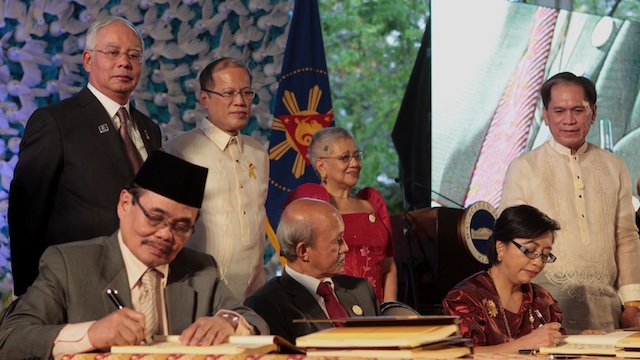
The Philippine government and the MILF finally sign the Comprehensive Agreement on the Bangsamoro on March 27 in Malacañang. MILF chairman Murad Ebrahim describes it as the “crowning glory of our struggle.” (INFOGRAPHIC: The Bangsamoro peace deal at a glance)
APRIL 20
The Bangsamoro Transition Commission completes its final draft of the proposed Bangsamoro Basic Law to Malacañang for review.
AUGUST 20
The commission submits the second draft of the proposed law to Aquino.
SEPTEMBER 10
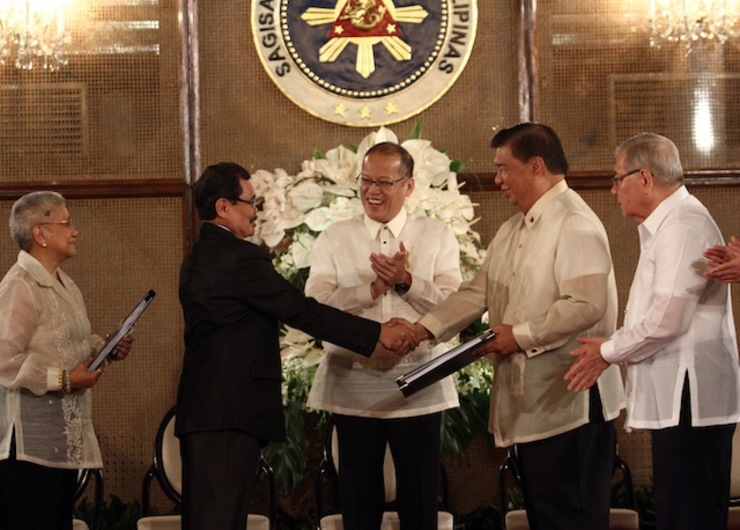
Aquino personally hands over the proposed Bangsamoro Basic Law to then-Senate-president Franklin Drilon and then-House-speaker Sonny Belmonte on September 10.
2015
JANUARY 25
Deliberations on the proposed bill are suspended in the aftermath of the deaths of 44 members of the Philippine National Police Special Action Force (PNP-SAF) following a clash with BIFF and MILF rebels, and other armed groups in Mamasapano, Maguindanao.
The MILF, meanwhile, urges lawmakers not to delay deliberations on the proposed BBL, claiming that their troops acted in self-defense during the Mamasapano clash. The group also denies coddling wanted terrorists “Marwan” and Abdulbasit Usman.
FEBRUARY
Several investigations and congressional hearings are conducted in the aftermath of the deadly Mamasapano clash. The Senate investigation is headed by Senator Grace Poe.
Then-president Aquino, meanwhile, vows to continue working towards peace.
MARCH 2
Congress leaders set the end of the second regular session (June 30) as the new deadline for the passage of the Bangsamoro Basic Law.
MARCH 17
A Senate panel report, which holds Aquino “ultimately responsible” for the botched operation, is submitted. The PNP, in its report, implicates resigned PNP chief director general Alan Purisima, adding that Aquino bypassed the chain of command in the PNP.
APRIL
The Senate continues its deliberations on the BBL following the submission of reports on the Mamasapano clash.
MAY 20
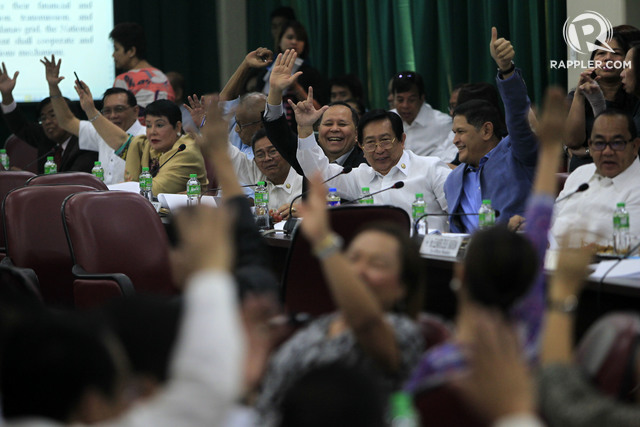
After a marathon of hearings, the House Ad Hoc Committee on the BBL approves the draft and the committee report of the proposed bill – the Basic Law for the Bangsamoro Autonomous Region (BLBAR).
2016
FEBRUARY 3
The 16th Congress fails to pass the BBL before it adjourns to give way to the campaign period.
JUNE 30
President Rodrigo Duterte is sworn into office. The first president from Mindanao, Duterte vows to finally bring peace to the region.
AUGUST 13
The MILF and the government launch formal meetings. Peace adviser Jesus Dureza says the meetings focus on crafting the new law that will implement the agreement, given the failure of the Bangsamoro Basic Law.
The two parties also agree to expand the Bangsamoro Transition Council (BTC) from 15 to 21.
2017
FEBRUARY 10
Duterte on February 10 names new members of the Bangsamoro Transition Committee which includes at least 3 members of the MILF. On February 24, during the formal launch of the BTC, he urges the committee to aspire for a draft that’s “acceptable,” adding that he’ll ask Filipinos nationwide to support it.
MAY 5
Duterte says he is “a bit pessimistic” about the Mindanao peace talks amid persistent tensions then between the Moro Islamic Liberation Front (MILF) and Moro National Liberation Front (MNLF).
JUNE 6
The 12-member BTC finalizes its draft of the Bangsamoro Basic Law. (READ: Final version of BBL holds fate of Mindanao peace process)
JULY 17
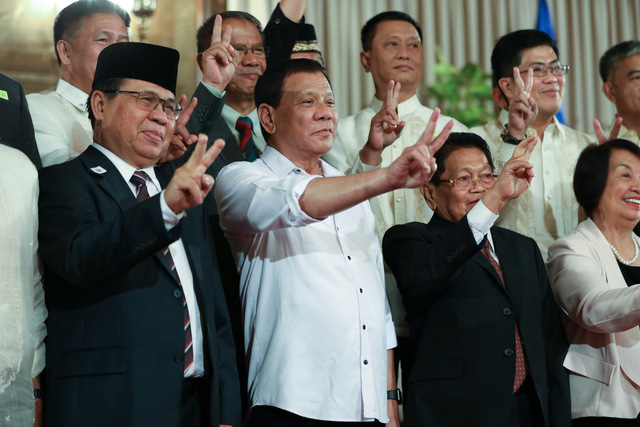
The committee submits the draft to Duterte.
AUGUST
As the House awaits the formal submission of the draft BBL by the BTC, former president and then- Pampanga-representative Gloria Arroyo files her own version of the law, which she says, "truly reflects the aspirations of our Muslim brothers and sisters as well as the indigenous brethren, representation to Indigenous Peoples, women, the sultanates, and other key stakeholders.”
SEPTEMBER 14
Dureza says Duterte wants to first come up with a "game plan" for smoothing out some of the contentious provisions of the proposed BBL before certifying it as urgent.
DECEMBER 19
Duterte says he is not confident that the proposed BBL is allowed by the 1987 Constitution.
2018
MAY 29
Duterte certifies the proposed Bangsamoro Basic Law (BBL) as urgent – a day before Congress adjourns. The release of certification comes after his meeting with Congress leaders and "much deliberation,” according to then-presidential-spokesperson Harry Roque.
MAY 30
The House of Representatives, on the last day of session, approves the proposed BBL.
MAY 31
The Senate, meanwhile, passes its own version past midnight.
JULY 18
The bicameral conference committee finalizes the bill that would establish and grant greater autonomy to a new Bangsamoro region after more than a week of deliberations to reconcile the differing provisions of the House and Senate versions.
JULY 23 AND 24
The Senate ratifies the bicam report on July 23 while the House of Representatives finishes on July 24.
JULY 26
Duterte signs the landmark Bangsamoro Organic Law that will pave the way, among others, for the new Bangsamoro Autonomous Region in Muslim Mindanao that would have greater fiscal autonomy, a regional government, parliament, and justice system, among others. (READ: After Bangsamoro law, a bright yet bumpy path to peace)
SEPTEMBER 5
The Commission on Elections announces that the plebiscite on the landmark law will take place on January 21, 2019. It sets the campaign period from December 7, 2018 to January 19, 2019.
OCTOBER 30
Sulu Governor Abdusakur Tan II files the first Supreme Court petition seeking to block the Bangsamoro Organic Law. He raises the issue of an opt-out provision.
DECEMBER7
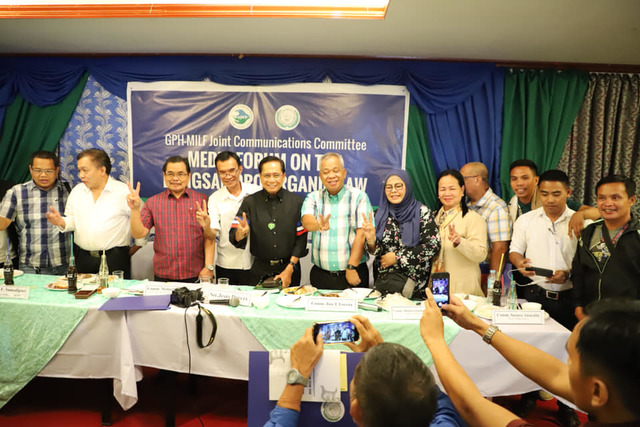
Government officials and MILF leaders kick off the campaign period by urging the public to unite and take part in the plebiscite which seeks to ratify the landmark Bangsamoro Organic Law.
DECEMBER 18
The Philippine Constitution Association (Philconsa) asks the Supreme Court to declare the BOL "unconstutitional, null and void.” It urges the High Court to issue a temporary restraining order on the implementation of the law.
2019
JANUARY 18
President Rodrigo Duterte makes a last minute campaign for the ratification of the Bangsamoro Organic Law (BOL) while in Cotabato City, saying that the people “should forget the bitterness of the past and look forward to the future.”
January 19
Cotabato City Mayor Cynthia Guiani Sayadi once again defends her opposition to the Bangsamoro Organic Law (BOL). The mayor is the champion of the "no" vote in the Bangsamoro plebiscite and has reported several instances of alleged harassment against her.
January 21
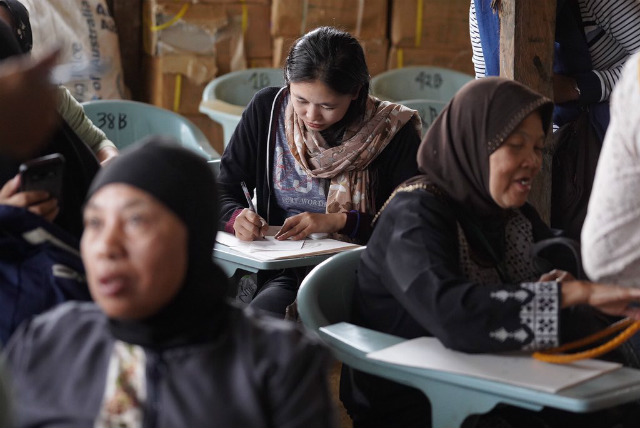
Voters in the Autonomous Region in Muslim Mindanao (ARMM), Cotabato City, and Isabela City, flock to their respective polling centers to cast their “yes” or “no” votes on whether the Bangsamoro Organic Law should be ratified and an expanded Bangsamoro region created.
Cotabato City – the "crown jewel" of the region – votes to join the proposed BARMM, according to unofficial results from the City Board of Canvassers as of 8:42 pm on Tuesday, January 22. The city had twice before rejected inclusion in the ARMM – in 1989 and in 2001.
Counting of votes is still ongoing as of Wednesday, January 23. The official and final results are expected by Saturday, January 26, at the latest. – with reports from Michael Bueza/Rappler.com
This timeline will be updated as results come in.
Top photo by Ben Nabong/Rappler
